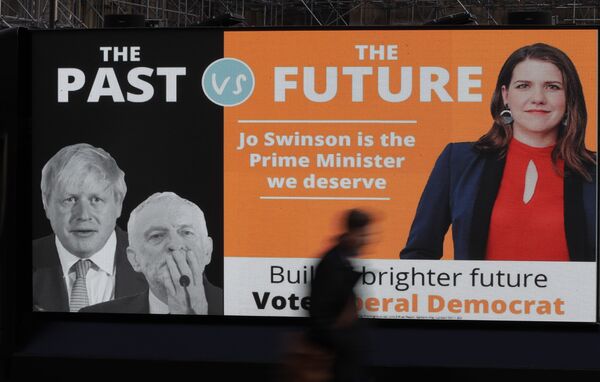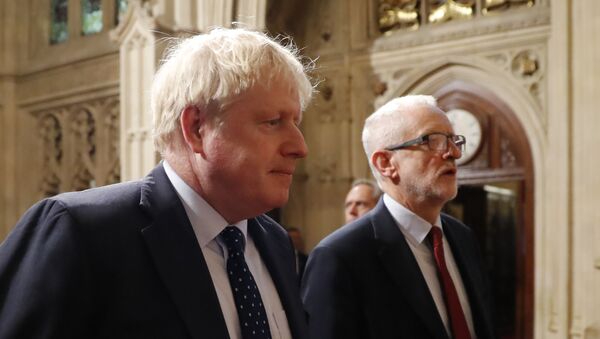Just hours before their first head-to-head TV debate, UK Prime Minister Boris Johnson has written to Labour leader Jeremy Corbyn outlining four crucial questions regarding his Brexit policy that he accused him of having evaded in the campaign so far, reported ITV.
The two rivals in the 12 December poll are set to clash on Brexit in the first half hour of the hour-long live programme on ITV, scheduled for 8 p.m., and then dwell on other issues.
"This election is about breaking the deadlock in parliament that has prevented us from getting Brexit done and working in the interests of the British people," Johnson writes. "The public have a right to know where the two candidates for prime minister stand on the big questions facing the country at this election. So far in this campaign, you have ducked those questions."
The Prime Minister proceeds to challenge Corbyn:
- “You are proposing a second referendum on EU membership. In that referendum, would you recommend the UK should remain or leave?”
- “Your previous manifesto promised to end freedom of movement, but following your conference it is now Labour Party policy to "maintain and extend" free movement. Would you end, maintain or extend free movement, and would immigration be higher or lower under Corbyn's Labour?”
- “Asked on Sunday if you were prepared to continue to pay into the EU budget on an ongoing basis, you replied "clearly if you want access to a market there are costs involved". How much would you be willing to pay into the EU budget in return for 'access to markets'?”
- “All 635 Conservative candidates standing at this election have pledged to me that, if elected, they will vote in parliament to pass my Brexit deal. Can you guarantee that every Labour candidate supports your Brexit policy?”
Boris Johnson concludes:
"Without satisfactory answers to these questions, the public will have no choice but to conclude that Corbyn's Labour, propped up by the SNP, will mean dither, delay, and uncertainty with two more chaotic referendums next year. Only the Conservatives will get Brexit done so the country can move on."
Earlier, a high court ruled that ITV's decision to exclude the Liberal Democrats and SNP from their leaders' debate on Tuesday was lawful and that the broadcaster can go ahead with putting the show on as planned.
Two leading judges ruled there was “no arguable breach of the Broadcasting Code”.
Lib Dem leader Jo Swinson responded to the ruling by saying:
"There are millions of people in our country who want to remain in the European Union, a key issue in this election. So to have a debate just between two people who want to leave the EU leaves out a whole side of that debate, leaves out and silences the voices of millions of people in this country."

Lib Dem representatives had lodged papers at the court in London last week and said it was “vital for our democracy” to have both sides of the Brexit debate included in TV debates during the election campaign.
Scottish First Minister Nicola Sturgeon said it was “fundamentally unfair” for other parties to be cut out of the debate.
However, Johnson's allies backed the decision to hold a debate with just the prime minister and the leader of the opposition.
Conservative Parliamentary Candidate Kwasi Kwarteng was quoted by Sky News as saying:
"We broadly have a two party system. Credibly only two people are going to be, or are likely to be prime minister, Boris Johnson and Jeremy Corbyn. It's important the electorate see the two on offer. Nicola Sturgeon cannot be prime minister. The SNP are not even standing in a majority of seats. Jo Swinson's chances are very small."
The Liberal Democrats have lost their high court challenge against ITV over the decision to not include Jo Swinson in TV debates ahead of the #GE2019. Asked previously, by 53% to 26% Brits thought Jo Swinson should be invited to take part https://t.co/9peud8Ekw0 pic.twitter.com/9KpInWkd2g
— YouGov (@YouGov) November 18, 2019
Tories storm ahead in polls
Labour’s Jeremy Corbyn goes into this debate trailing Conservative Boris Johnson badly in personal approval ratings.
Johnson has continued to enjoy a substantial lead over Corbyn, extending his lead to ten points, according to the latest ICM opinion poll.
The Conservatives have risen by three points to 42 per cent – their highest poll rating in published ICM voting intention polls since September 2018.
Labour have only gained one point, taking them to 32 per cent.
The Liberal Democrats fell two percentage points to 13 percent.
The Brexit Party is also down three points to just five per cent.
In further good news for the Prime Minister, the Tories enjoyed a growing lead in marginal seats, which Johnson must win if he wants to have a workable majority in the next Parliament.


